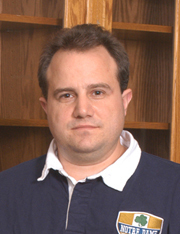
The University of Notre Dame’s Department of Civil Engineering and Geological Sciences, which already is nationally respected for its work in energy and environmental issues, has strengthened those efforts with the addition of Thomas E. Albrecht-Schmitt, a renowned expert in the materials and solid-state chemistry of heavy elements, especially uranium, neptunium and plutonium.
Previously a professor of chemistry at Auburn University, Albrecht-Schmitt has created several new materials with these elements that offer unique properties necessary for the advancement of clean, and green, energy.
This is important because research in heavy elements yields fundamental insights that can be used to develop new technologies and processes for the safe handling and disposition of radioactive materials. Studies of these elements and their by-products help address the environmental consequences of weapons programs, as well as the release of nuclear materials into the environment from nuclear energy production.
For example, novel materials that can work in extremely high radiation fields could lead to the development of advanced waste forms for safely storing the unwanted by-products of nuclear power. Likewise, the same material could offer properties that would deter these same by-products from leaching into the environment.
Albrecht-Schmitt’s research interests include solid-state chemistry (focusing on actinides), nuclear waste disposal, structure-property relationships in novel crystalline solids, environmental chemistry and crystal structure analysis.
He earned his bachelor’s degree in chemistry from Southwest Minnesota State University in 1993 and his master’s (1994) and doctoral (1997) degrees in chemistry from Northwestern University.
More information about research initiatives in energy and the environment in the Department of Civil Engineering and Geological Sciences at Notre Dame is available at http://www.nd.edu/~cegeos/Research/research2.htm.